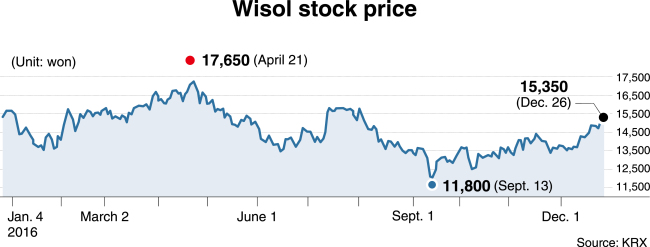Mobile & Internet
Wisol grows with evolving telecommunication technology
[THE INVESTOR] As the single largest surface acoustic wave filter manufacturer in Korea, Wisol is growing not only at a fast rate, but also with stability in line with rising global demand for the smartphone component.
The SAW filter used in mobile phones sifts necessary communications signals that are detected by the mobile phone antenna. Developing the filter involves high technologies as well as high costs and is rarely challenged by newcomers.
 |
The Kosdaq-listed Wisol is the only SAW filter maker in Korea, while there are just two other rivals in the global market, Murata and TDK in Japan.
The company was spun off from Samsung Electro-Mechanics and established as an independent firm in 2008. It went public on the Kosdaq in 2010.
The company has its headquarters in Osan, Gyeonggi Province with a total of 374 employees, and has larger operations in other countries. The company has hired 639 employees in Tianjin, China and 162 in Hanoi, Vietnam.
The SAW filter market is forecast to continue growing, since the part has just started being used for 4G smartphones. The percentage of smartphones embedded with the SAW filter is currently 19.2 percent across the world, which has great room for growth, according to market observers.
“Wisol can be attractive to investors in three points,” said Choi Joon-young, an analyst at NH Investment & Securities. “It is one of three SAW filter makers existing on earth and has major captive customers.”
Second of all, the analyst pointed out the firm’s sales in the Chinese market is rising at a significant pace. The company’s China sales is estimated to be around 81.5 billion won this year. The figure is expected to further rise to 106.3 billion won in 2017, Choi said.
According to market estimates, Wisol would reach 434.2 billion won in annual sales by the end of December and 42.1 billion won in operating profit. Its annual sales next year would surpass 500 billion won, growing by about 16 percent, the securities brokerage firm said. The operating profit is projected to rise 14 percent to 47.8 billion won in 2017.
“SAW filer is a key, essential part for 4G smartphones,” Choi said. “The market would grow in line with the 4G smartphone market.”
In North America, smartphones with SAW filters account for 59 percent of the total phones being currently used. About 45 percent of smartphones in China are with SAW filters, and 20 percent in Europe.
“Considering the relatively low penetration percentages, there is great room for growth in demand,” Choi said.
On average, 20 SAW filters go into a 3G mobile phone and 30 filters in a 4G phone.
Globally, shipments of 4G smartphones are increasing at a rapid rate. From 18 percent in the first quarter of 2014, the 4G smartphone shipments jumped to 62 percent in the second quarter of 2016. During the same period, the percentage in North America rose from 70 to 89 percent, and 23 to 68 percent in Europe.
“As the number of people switching to 4G smartphones and as the generation of communications technology evolves, the number of needed filters would increase, boosting Wisol’s growth,” the analyst said.
Wisol relies not much on a particular model of smartphones made by a certain maker, which is an advantage, said Lee Dong-joo, an analyst at KTB Investment & Securities.
“Wisol had a limited impact from the Galaxy Note 7 recall issue, since the firm’s part goes into all 4G phones regardless of brands or models,” Lee said. “The stock valuation is appealing enough considering its steady growth.”
Beside the SAW filter business, Wisol produces radio frequency modules that enable a wireless device to connect with other IT devices within 100 meters in distance.
The company is a partner of France’s communications service provider Sigfox on RF modules. Wisol has begun providing a standard module for Sigfox services, which are used by about 150 firms around the world.
By Song Su-hyun/The Korea Herald (song@heraldcorp.com)








